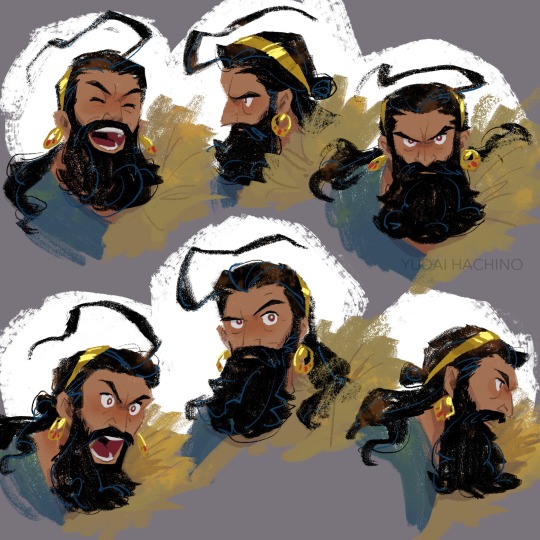Early twenty years old fangirl. Huge Meta Lover. Love controversial characters (Izaya, Karna, Damian, Fushimi, Munakata, etc). Love all robins actually. Hisoillu shipper. Has a habit to jump on a fandom way too late past its time and suffer for it. Currently on Epic of Gilgamesh and Naruto
Don't wanna be here? Send us removal request.
Text
According to Andrew George, 2 factors contributed to this discrepancy. One, the difference between Sumerian version and Akkadian Standard version regarding that passage, most notable on the change from third-person subject to second-person. Third-person subject opened the possibility of other person that was described by Enkidu, suspected a woman (no notable name or title) as Gilgamesh's sexual partner.


BUT, it's always been suspected among translators that Enkidu reported about his own body, because even on Sumerian version the word 'gis' being used, meaning penis. Woman doesn't have penis, so which penis that Gilgamesh enjoy to touch, being eaten by moth in Underworld, and can be observed closely by Enkidu? Thus brings us to the second factor, another possible translation discrepancy between 2 very ancient language (now I kinda feel sorry for those researchers). Sumerian's word gal.la is translated as 'vulva' but the word's counterparts in Akkadian are more gender neutral, 'vulva' and 'crotch'.

Sumerian dictionary :

Akkadian dictionary :



Now it can be noted that while Akkadian version (especially the Standard version which is the most concise and contains most frames of Epic of Gilgamesh) is fragmented, the Sumerian version is, practically, crumbles. So much so to the point ETCSL didn't translate the passage fully (The passage in Sumerian didn't have the word for 'wife' and 'son' like mentioned in Dalley's translation so with the question mark on those words I assume that they are Dalley's personal liberty/interpretation).

While Andrew George translate the much more complete Tablet 12 in neutral standpoint.

In conclusion? Make that at your will, since even the expert still had no idea haha. Personally I think it's more logical that Enkidu describe the state of his own body, but still we can't ignore the clear implication of women genitalia in Sumerian version so... 50/50? It may be Enkidu's, it may be other woman's vulva and man's penis (NOT HIS SON Gilgamesh had enough sexual problematic trait already)

Your WHAT that Gilgamesh touched to please his heart, Enkidu?
#the epic of gilgamesh#enkidu#gilgamesh#learning discrepancy between Sumerian and Akkadian is fun#and massively frustrating#funnily in Ishtar's case her Akkadian version is the one being “straighten out”#her divine attendant Ninshubur is women in Sumerian version#but Akkadian change it to man#IIRC#one thing for sure is that passage is 100% undoubtedly sexually explicit#so no matter what your interpretation is don't be coward like Jackson#“skin and bones” booo#Please don't mind me I'll reblog your post with an essay
767 notes
·
View notes
Text
Kakashi and Naruto's relationship is truly so precious 😍😍
#hatake kakashi#kakashi#uchiha obito#obito#uzumaki naruto#naruto#epic the musical#we'll be fine#naruto shippuden#reblogs
28 notes
·
View notes
Text
Surya tried. Truly, he tried to be good father Karna. He indeed never revealed his parentage to Karna but to be fair for the length of Mahabharata Karna's power associated by Sun so much and he was called Vaikartana (descendant of the Sun) even before the big reveal. It's practically open secret that Karna is some blessing from Surya in whatever form, even Yama said that to Pandava in their exile that Karna's armor is blessing from Surya since birth. At that time demigod is not really rare. The sky practically split into two on ranghabhoomi because Surya did the big godly Percy Jackson claim "he is mine" move (while Indra did the same). Surya didn't just ask Karna to not give up his armor or at least trade it, he also gave Karna clue how to identify Indra's disguise.
The punchline of "I am your father, Luke" side plot of Karna is the fact that he was son of Kunti a.k.a Pandava's elder brother, which, technically not his secret to tell since it's not his reputation is on the line. That's why only when Kunti confessed to Karna Surya also practically said "yeah son that's all true so please please listen to your mother". The problem is that Karna is rebellious son of a bitch (no offense to Kunti) whom really only do what elders were asked NOT TO DO. And Surya is not the type of parent to bail his child when the problem is the child's own mistake like he allowed Indra to bite Karna's thigh because all in all it's wrong to lie to your guru but interfered when Indra asked his armor unprompted.
In Mahabharata it says after his death there's light came after Karna's body and went up to sky and I'd like to think that's Surya's way to bring Karna to Suryalok by his ears so he can fulfill his desire to parent the crap outta Karna as one of 12 Adityas
Desperately need to talk about how fatherhood works in the Mahabharata for Surya and Indra with their mortal sons.
Arjuna is known as Indra's child. His most common epithets (related to familial lineage) largely come from his mother, but it is openly understood that he is Indra's child. Indra helps him out so many times and it's wholesome as hell.
Then you have Karna, who is not acknowledged as Surya's son, and Surya keeps Kunti's secret either out of duty or regret (for leaving a child with a baby, that is). So his help is next to nothing for most of Karna's life. And then the event comes when his brother is about to take away his son's armour, the only protection he has been able to offer this boy, and he knows Karna will give it away but he goes to dissuade him anyway. When he comes, in most versions, he says he comes to aid an ardent devotee. In BORI he says that there is a secret he cannot reveal, but he is here to warn Karna out of love.
And it stands out to me so much, that from Karna's perspective, he meets his father through years of devotion and prayer, because you can tell he thinks of Surya as his mentor and spiritual guide, and Adhiratha as his father. He has next to no qualms in claiming Radha as his mother even after he is told the truth, and his reaction to Kunti being his mother is not dissimilar.
And then this god shows up, does not even bother to reveal that he is his father (I imagine Karna must have been pretty peeved when he found out - in a "you could've just told me when you visited" way) and asks him to let go of the one thing he takes great pride in. Even there too, there is a great deal of respect for agency: Karna is firm and Surya compromises. If they'd had a few more chances to interact, I think they would work out pretty well.
And then you have Arjun and Indra, so beautifully entwined, so beloved and so dear. Indra helping Arjuna is seen as interference (and rightly so), but there is something so paternal about how Indra desperately tries to protect his child - depending on the version he (not necessarily chronologically):
a) mitigates the Urvashi curse,
b) sends out the Gandharvas to heckle the Kauravas
c) bestows divine counsel upon his son
d) gives him a great bow after getting thrashed
e) turns into an insect and gets Karna cursed.
And most importantly, he shows up at a MORTAL'S door, CLAIMING TO BE A BRAHMAN (which is, again depending on version, one of reasons why said mortal got cursed), declines offers of land and money and girls, and shamelessly demands the armour. A KING. REDUCED TO A BEGGAR.
Because remember, technically Brahman's are given state funding for their research, education, priesthood, or simply their birth. Indra does none of these. He knows this. Karna knows this. He knows that Karna knows this. But he demands it anyway.
Obviously, Karna's devotion to the Sun God, and the fact the said god is his father is a narrative device meant to represent his arc of reaching for the sun and getting burned (in most cases, at least), while Arjuna's relation to Indra and his rain motifs is because narratively he peaks at terminal velocity and then freefalls to the earth as soon as Krishna dies.
But I love thinking of what their respective relations to their fathers must have been, and how it mirrors/contrasts Kunti's relationship with the gods. Kunti calls Indra and he does what she wants (for him to give her a baby), and is able to support their child in most cases. Surya is called and he does not do what Kunti wants (for him to leave immediately), and his relationship with their son is one of distance and endurance. But they are good fathers still, as good as god can be. (Except Surya with Shani. Idk what's going on there).
Anyway I forgot what point I was trying to make... but yeah!
#mahabharata#karna#surya#but yeah Surya is more distant parent that Indra#I guess because Karna didn't really ask something from Surya?#In term of presentation in their child's lives the rank is Indra - Yama - Surya - Ashwin twins#Ganga is complicated because she WANTED to take Bhisma but Santanu didn't want it#sorry I reblog your post with an essay
76 notes
·
View notes
Text
Sophus Helle essay mentioned! 🤩🤩
I really love how the first hero epic in history is not all about glory and conquest, but about love and mortality. And also one other gem from that essay

Little linguistic observation, here's the cuneiform for heart (libbu : 𒊮), and here's the cuneiform for love (ramu):
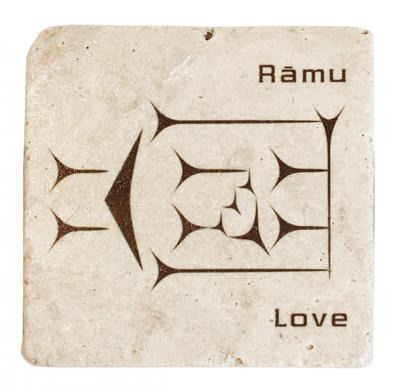

Notice the anatomically wrong placement of the "heart"? Some theorized that the creator of that alphabet didn't put the "heart" on the true placement in human body, but the side where they felt their own heart beating when seeing someone they loved. That's right, the word for "love" is supposed to be created with the existence of a match.
Just like Enkidu was created to be "a match for the storm of Gilgamesh's heart" (libbi suluu mehru).
Whom Gilgamesh dreamt that he will love and caress like a wife (aramsuma kima assatim habubu elsu) before their meeting
And whom Gilgamesh loved greatly (arammusu dannis) after his death
This is singlehandedly the most romantic trivia that I ever know about a civilization from thousand years ago.

sophus helle - gilgamesh (essays) // the storm of his heart
#gilgamesh#the epic of gilgamesh#cuneiform#linguistics#studying Akkadian made me remember that Middle East language is so poetic#and very blush-maker#I feel like being back into 6th grade and giggling over “khumaira”#Sophus Helle essay is truly the best#sorry I reblog your post with an essay
398 notes
·
View notes
Text
discord server sounds nice!
If you are interested and excited by anything to do with Mesopotamia, with the Sumerians, Akkadians, Assyrians, Babylonians, and all of the niche ancient history things, please interact with me 🙏. I love talking to people about these things and expanding my knowledge but it's so difficult to find people who are truly interested in this subject.
Maybe I should create a discord server for this.
12 notes
·
View notes
Note
Wow, that's amazing, I have no idea that the composition of 1 line in Gilgamesh made by 4 different fragments fused together like a puzzle. Made me realize how ancient and fragile the story actually is.
Also very amusing for me that even writer from thousands years ago combined very commonly used alphabets/words together for practicality, laziness is truly a concept beyond time XD
So I assumed that the "lu" on mayalu/majalu is the indication that the word is in plural? I think George, Sophus, and Kovacs all translated the word as "beds" in plural (In Kovacs' case she translated it as "couches")
Hello, I wonder do you still accept asks? Because me and my friends kinda self-taught myself on Akkadian recently and there's passage that kinda... sparked debates among my peers. I can't find the cuneiform but the Akkadian sounds like this :
ü-tu-lu-ma etlütu (gurus) [sa i] - [na ma] -a-a-al mu-si sal-lu
Professional Assyriologist (Andrew George) translated that passage as :
The men were lying down, that were asleep on beds for the night
From the Akkadian dictionary we can identify some words
Utulu : [itulu] lay down
Etlutu (gurus) : Young men
Mu-si : at night
Sal-lu : sleep
Other words are too fragmentary for the admittedly amateur me to decipher, but I can't find any usual word for bed in that passage either "bitu" (bedroom), "erim", "gisnu", "huralbu", "i'lum", "marsu", or any other possible words for bed that you can find on the dictionary, let alone the proof that the word is plural. The closest I can find is, perhaps, that [na ma] there is a fragmentary word for "namallu" which in dictionary means "plank bed", double-sided bed. And also I can't find plural form on that line, so perhaps you can help me? Not necessary about the bed/beds, but more about how will you translate that line?
Hi! The fragment you mention is from the SB Epic of Gilgamesh, VI.180. Here is the score for that line (a comparison of various manuscripts):

Although the second line is a little different, we can use it in combination with the other versions to reassemble the likely original line: "ú-tu-lu-ma GURUŠ.MEŠ šá i-na ma-a-a-l mu-ši ṣal-lu." Whenever you see a double "-a-", as in "ma-a-a-l," it's generally transliterating a y/j sound, so it's listed in the dictionary as either "majālu" or "mayālu" (depending on how German your dictionary is!). "Majālu" is a relatively common Akkadian word for a bed or sleeping place. It's rendered in version 1 as "majāl" (no case ending) because "ina" will often occur with the bound (i.e. stripped-down) form of. noun.
So the word-for-word literal translation is "and-they-lay-down, the-young-men, in bed, at-night, sleeping."
Hope that helps, but let me know if you have further questions!
#the epic of gilgamesh#linguistics#assyrian#akkadian#akkadian language#cuneiform#I think kinda anachronism for Kovacs to translate the word as “couches”#because I don't think “couch” exist at that time#or is it?#more likely benches tho#and kinda weird for Enkidu to if he received the prophecy of his death in benches
33 notes
·
View notes
Note
Ah yeah the possessive suffix! If -ni is for third person pronoun (his/her/their), -ngu is for first person pronoun (my), then how about second person pronoun (your)? In Sumerian Lexicon it's -zu but is that non standard transliteration too?
Silim! Sorry I wanna ask again hehe, what is the cuneiform letter for the word "beloved" and also the right pronunciation? Because when I looked at Sumerian Lexicon the word is pronounced as "ki-ág" but on Electronic Text Cospus of Sumerian Literature the word is pronounced as "ki aj-ja-ni"
Silim! So both of the examples you have here are (non-standard) transliterations - the ETCSL's in particular is used for search strings only, because there's no single English letter that corresponds to the Sumerian "ng" sound, so they chose the (unrelated) letter "j" to make searching their site easier.
The cuneiform for this word is 𒆠𒉘 or 𒆠𒉘𒂷, pronounced kiang or kianga respectively. The "ng" is pronounced like the sound in English "singing", not with a hard "g" like in "finger". So it'd be approximately "kee-awng(-uh)" (if that's helpful!)
The form you list with -ni on the end includes the possessive suffix corresponding to "his/her", so kiangani 𒆠𒉘𒂷𒉌 would be "his/her beloved". "My beloved" would be kiangangu 𒆠𒉘𒂷𒈬.
26 notes
·
View notes
Text
As someone who just having a mostly calm discussion about Gilgamesh on Youtube comment section, I feel this on a very personal level
"If they have explicit sex in the woods it will make Enkidu's death more tragic for Gilgamesh and the story, like Romeo-Juliet and Titanic"
Enkidu's death is the peak tragedy for Gilgamesh? Am I the only one who almost break down in tears when reading the "May the sacred River Ulày mourn you, along whose banks we would walk so lusty!" line? Like, these two friends who just love each other so much so they treasured everything they did together, even just a mere strolling around in the banks of river? But they will never ever walk together again? So the one who got left behind deeply mourned that and wish the nature itself who accompany them on their private time together mourned it too?
Oh sorry what am I thinking, surely 2 dumb teenagers who killed themselves over misunderstanding and a one-day couple whose their relationship based on one naked painting are more tragic because they had ~SEX~
"They embrace and caress each other but they don't elope"
Stop confusing The Epic of Gilgamesh with modern queer stories whose their primary focus is about the forbidden/oppression of it. Those stories have their points but they definitely have different message than a story from 4000+ years ancient civilization.
"Gilgamesh is a very macho man"
So is Enkidu! Them loving each other doesn't diminish either of that!
"Why doesn't they omitted the word 'friend' and exclusively using 'lover'"
I'm this close from physically fight someone, their friendship is the main course of the Epic and frankly I prefer their romantic bits were erased if it means that their friendship will be damaged. If only friendship and love can co-exist without sacrificing the other, oh wait
not to start discourse about a 4000 year old story but like, if you are more interested in the fact that enkidu and gilgamesh are gay than you are about the fact that they loved each other I'm going to kill you with The South Wind, the North Wind, The East Wind, the West Wind, The Blowing Wind, The Squally Wind, The Shaparziqqu Wind,The Evil Storm, The Sihurra Wind, The Wind of Frost, The Storm, and The Thunder Storm
#the epic of gilgamesh#gilgamesh#enkidu#This post is truly big mood#I am on the opinion that they have romantic and sexual relationship#one of it is because the dream segment is undeniably anything but platonic#but I think that's just a fun trivia and hardly the point of the story#please let them love each other peacefully#and treasure that beautiful relationship in any form#instead of resenting them or fetishizing them for the obsession of “gay”#sorry I reblog your post with an essay
33 notes
·
View notes
Note
To be fair, the current leading researcher of the Epic of Gilgamesh implied that Enkidu may have 2 sets of genitals
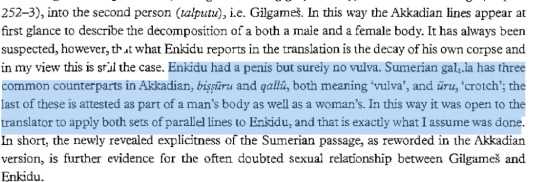
(still amazed that a very acclaimed scholar just casually said "it's up to you to think that Enkidu has vagina or not. He surely has penis tho, duh" in his academic paper)
So yeah, that's why I don't mind Fate's non-binary Enkidu too much. The twinkification is absolutely terrible but they already twinkified Gilgamesh decades earlier so perhaps it can't be helped, since the Epic itself, which in legend is written my Gilgamesh, used many feminine words to describe Enkidu like wife, bride, etc.
(a journal from 1930 researcher who suggest that if the Epic was written by Enkidu then Gilgamesh may be the feminine one by using feminine words to describe Gilgamesh's canon aspects, like being soft-hearted toward Humbaba, needed reassurance on Cedar forest, or being defended from a pushy goddess still haunts me till this day).
I just found put about fate's version of enkidu
and i wanted to talk with an expert
Sir What happened to my mesopotamian furry?
from my understanding their interpretation of it is that Enkidu basically took on the appearance of the women who stayed with them for the week more closely than in the original, so Enkidu looks almost identical to her.

here’s enkidu pre-humanifization
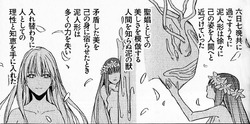
and this is the woman and enkidu, so you can really see the similarities (this is the best quality panels i could grab)
They very much lean into the nature aspect of Enkdiu’s story so there’s still that strong connection. Oh and also Fate made them canonically nonbinary because of the fact that Enkidu was originally clay.
other than that i think they just wanted to make a femboy for gilgamesh
#the epic of gilgamesh#fate series#fate gilgamesh#fate enkidu#gilgamesh#enkidu#not that I think Epic Enkidu is feminine tho#he's as brute and bara as any other wild man#Gil is just being tenderly poetic#and while the Epic used many feminine words for Enkidu#the Epic also very much empowering Enkidu on masculine aspect#I mean it has Enkidu bang someone for 2 weeks straight#sorry I reblog your post with an essay
24 notes
·
View notes
Photo
It took an embarrassingly long time plus twink redrawing for me to realize that Gilgamesh and Enkidu wore the same style of clothing. In my defense, I was distracted by ancient depiction of hourglass body of Enkidu and the manhwa-man-triangle body of Gilgamesh (broad shoulder with ridiculously small waist).

OH MY SHIT I NEARLY FUCKING PEED MYSELF LAUGHING XD
#the epic of gilgamesh#gilgamesh#enkidu#fate enkidu#fate gilgamesh#fate series#like seriously is it only my perspective or Gilgamesh's waist is so tiny on that statue#no comment for Enkidu twerk that beastly hip my boy#in all seriousness they make me wanna wear that model of cloth too#looks so elegant#I will prefer more covering on the lower hip tho#sorry I reblog your post with an essay
172 notes
·
View notes
Text
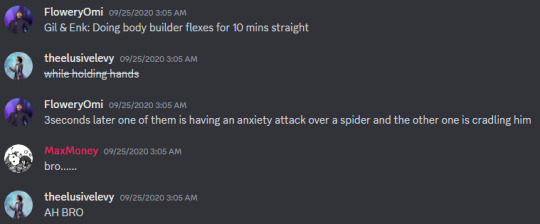
Epic of Gilgamesh in a nutshell. A.k.a the pure, true form of yaoi
#the epic of gilgamesh#gilgamesh#enkidu#somehow this convo made me laugh for a solid 5 minutes#not the censorship on “holding hands” XD#BRO...#independent post
9 notes
·
View notes
Text
You may
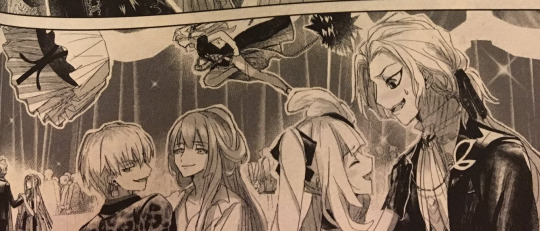
Source : FGO ala Carte X
Epic version
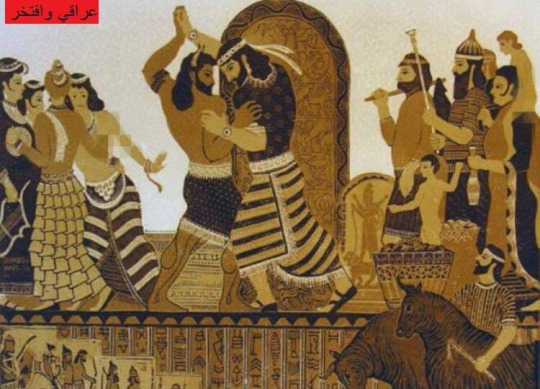

May I have this dance?
43 notes
·
View notes
Text
As much as they are frustrating, I think lacunas are actually quite interesting sometimes. We can practically imagine ANYTHING can happen in that missing line. There's angsty case like above, also the long void on Enkidu's death, and there's funny (in my very low-sense of humor) example like this one :

The fortuitously lines missing between Enkidu's first display of anger and when he went to Uruk to beat some sense on Gilgamesh for me looks like a censorship on whatever continuation display of anger that Enkidu had.
Enkidu : THAT NASTY PIECE OF SHI- [EXPLETIVE WORDS]

#gilgamesh#enkidu#the epic of gilgamesh#I am so amused by the fact that Enkidu is actually the potty-mouth between those two#like Gilgamesh's diss track to Ishtar is actually quite fancy and dignified#compared to Enkidu's “middle-finger” throw with the actual BULL'S PENIS#also the time when Enkidu cursed a door and Gilgamesh was so appalled by the display of rudeness#he was like : my friend you are a well-educated gentleman how could you#God Enkidu is so painfully a country boy and Gilgamesh is so painfully a city boy#Gil is the one who sip wine from fancy glass and Enkidu is the one who gobbled the beer straight from barrel#wait I think that is canon already in Fate world#sorry I reblog your post with an essay
5K notes
·
View notes
Note
Can 𒍝 (za) be used? It translated as "precious stone/gem/jewel" so perhaps it can't be used for many object but Andrew George translated that word as "own one" in regard of a person (Enkidu) alongside of 𒆗 (kal).
Sumerian sentence (I can't find the cuneiform form on internet 😅):

Andrew George translation :

The Electronic Text Corpus of Sumerian Literature translation :

Also I tried to study that Sumerian translation word-to-word, based on this Sumerian Lexicon, please correct me if I am wrong
za : precious stone, jewel, own one(?)
a : nominalizing suffix for noun, equivalent to 'the'
zu : second-person pronoun (your)
mu.si.du : will come to you, I don't know the elaboration but I found in lexicon that 'du' means come
kal : valuable, precious
Would there be a word in sumerian for "precious" or something similar relating to an object/person of great importance?
Hello! For "precious" I'd most often use the word kal 𒆗 "valuable, excellent, rare" (prior post here). Another term is sag 𒅆𒂟 "rare, high quality," which I'd use for objects (or land - "most arable") but probably not for people. And there's dugud 𒂂 "weighty, important", which is also my tumblr badge!
For another favorite word of mine with an overlapping meaning, see this post on "eternal treasure" and this post on "important".
#the epic of gilgamesh#death of gilgamesh poem#sumerian language#Sumerian languange reminds me of my (failed) attempt on learning Chinese#one syllable one alphabet with massive abundance of different meaning#the cost of being hyperfixated for one himbo ancient King....#sorry i reblog your post with an essay
22 notes
·
View notes
Note
Oh I see, when you put it with cup measurement that makes more sense, dunno why when I saw 300 ml oil my first thought is the amount of cooking oil in my family for like 3-4 times of stir fry cooking in a big fry pan (and it can last for like 1 month)

So like, I know that Gilgamesh is quite explicitly described as very buff and massive but when I imagine his chest was like 3-4 times frying pan wide so to think Enkidu used oil equal to usage on family meal for a month for one time Gilgamesh chest-smoother use is so surprising for me haha. But the alternative is Enkidu drowned Gilgamesh with 2,378 gallons of oil 🤣🤣
I really love when ancient literature truly shows us how different their life with ours but also how we can relate deeply with them
Hello, I wanna ask, what exactly measurement of "shekel" in Sumerian? The reason I asked the question is because of this passage on "Bilgamesh and Huwawa" poem
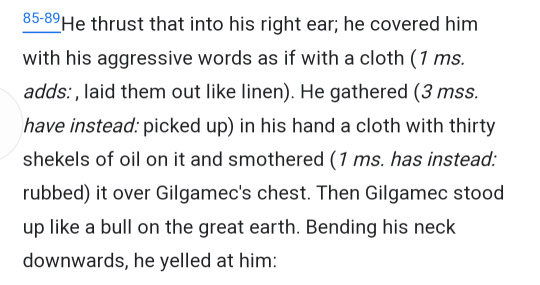
I did some googling but other than Israel currency, shekel is only appeared as measurement for weight like silver, and 30 shekels are more n less equal to 340 gr. But I don't think that measurement is ever used in liquid object like oil? (CMIIW) Also isn't 340 gr oil too much to be used only to wake up someone (but to be fair, Gilgamesh's chest was explicitly noted to be massive)? Or is that the weight of oil + cloth that Enkidu used? Or did that mean something different entirely?
Hello! The term "shekel" is a translation of the Sumerian unit ging 𒂆, which was 1/60 of a mina, and could be used for weight of any object (though silver is most common). The exact weight of a ging could vary, anywhere between about 8 and 12 grams. The phrasing in the original text is tug 30 ging ia "a cloth (of) 30 ging of oil," which means the amount of oil would convert to around 300 ml, between a cup and a cup and a half. To me that doesn't seem unreasonable for attempting to fully smother a demigod's chest in oil, not just to wake him up but to prepare him for his day - oiling of the body was a common practice, and, for example, is a key part of the "humanization" of Enkidu in the Epic of Gilgamesh.
Do note that the term ging can also refer to a separate unit of volume, which Halloran lists as about 0.3 cubic meters. This would convert out to about 2,378 gallons of oil, which is definitely not what's meant here.
#gilgamesh#the epic of gilgamesh#for a heroic story the Epic of Gilgamesh surprisingly showed us many times#about our ancient heroes' lives and personal matter#like I don't think hero journey needs description of how Enkidu slept by splayed out like net#while Gilgamesh slept curled up with his chin on his knees#also the amount of oil needed to wake and prepare one spoiled Gilgamesh#but I REALLY appreciate those tiny details#very very cute#sorry i reblog your post with an essay
30 notes
·
View notes
Text
I don't think dying by sickness is dehumanizing by ancient Mesopotamia standard, considering that even the hero Gilgamesh himself died by old age/sickness. Indeed Enkidu lamented that the fact he died by sickness and not from battle brings no fame and glory for him. But he also told Gilgamesh to not forget about him, and Gilgamesh fulfilled that wish to the point that he (quite obnoxiously) told everyone about Enkidu's death and how imprinted it is to his self. Considering that Gilgamesh's death tablet also ended with funeral plus citing all of his beloveds and accomplishments, I think the true human death in ancient Mesopotamian standard is "still be remembered by the alive". IIRC that's what made Enkidu cried before Humbaba expedition, because Ninsun pointed out that Enkidu has no family, has no one to mourn him, has no one to hold funeral for him.
Suffice to say that according to ancient Mesopotamia, what differentiate between human and animal are bath, beer, and personal relationship that transcend mortal death.
idk how to explain this but I haven't been able to get it out of my head, Do you think Enkidu not being able to die as a warrior was also the gods' way of stripping the last of Enkidu's humanity?
Letting him die like a sick animal, not as a honorable human
Idk this probably makes no sense
#the epic of gilgamesh#gilgamesh#enkidu#by the same logic if the legend is true that Gilgamesh is the one who wrote his tale#then he gave Enkidu and himself the highest honor as human#to have their name and lives be remembered by the living even after thousands years passed#I can imagine Enkidu feels deeply touched to see so many people remembered and mourned his death#after being saddened by his orphan status and Humbaba's curse to have no one beside him but Gilgamesh#somehow that makes me emotional#sorry I reblog your post with an essay
15 notes
·
View notes
